This woman has been arrested 131 times fighting for disability rights—and she’s not done yet
One of the most striking protests in Washington, D.C. so far this year—and there have been many, over everything from immigration to taxes—came courtesy of ADAPT, a grassroots disability rights organization on the front lines of the battle for health care.
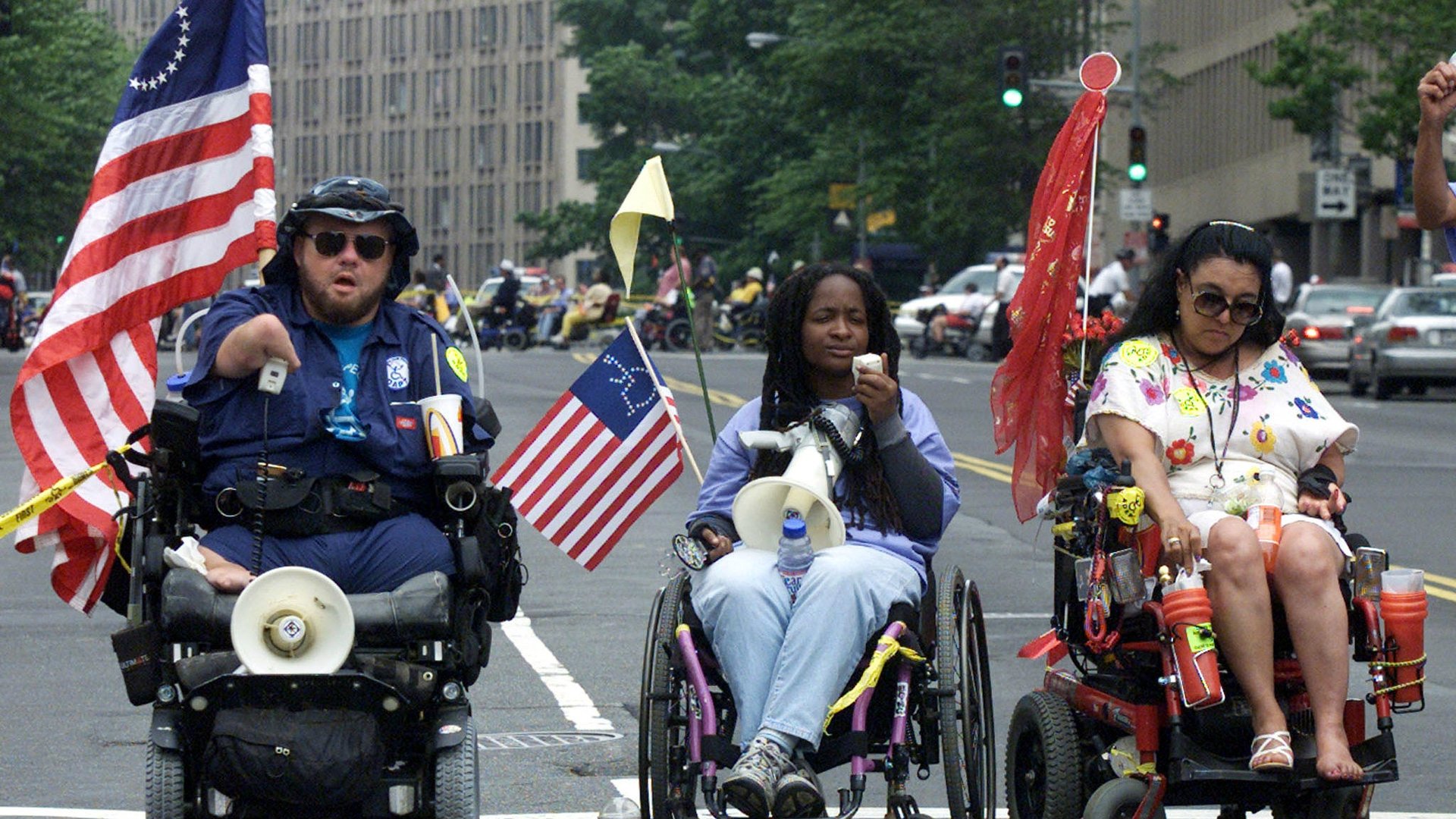

One of the most striking protests in Washington, D.C. so far this year—and there have been many, over everything from immigration to taxes—came courtesy of ADAPT, a grassroots disability rights organization on the front lines of the battle for health care.
In June, ADAPT staged a demonstration against Republicans’ proposed cuts to Medicaid outside Senate majority leader Mitch McConnell’s office. Dozens of disabled protesters held a “die-in”, removing themselves from wheelchairs and scooters and lying on the floor. The drastic approach was designed to call attention to how the badly the cuts could hurt the disabled and ended in several people being dragged from the building by police.
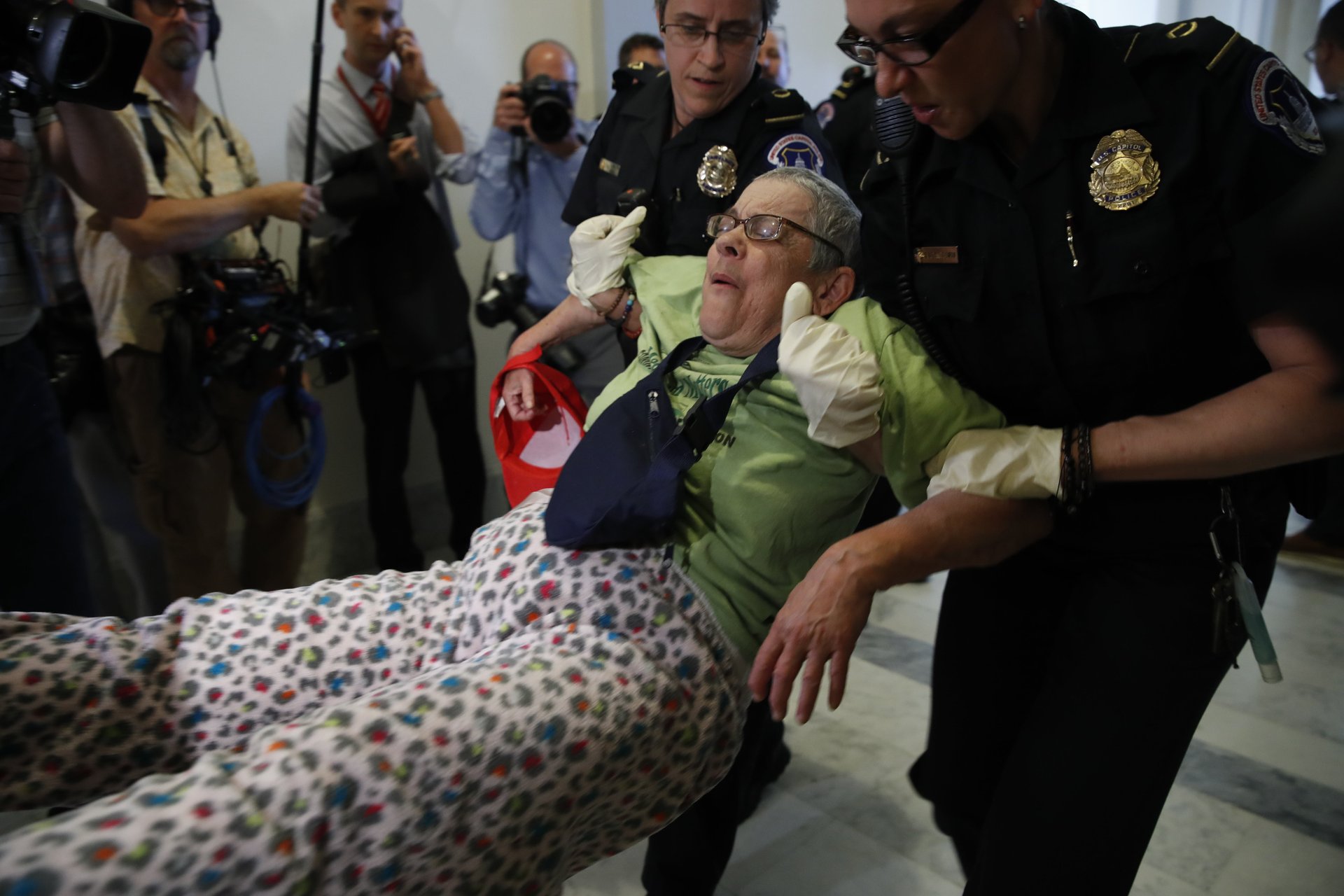
Anita Cameron, one of the protesters arrested that day, has a message for people who are shocked by the photos. “Concentrate on why we’re there, and not how we’re being treated” by police, she says. “People look at the disability and they think we are helpless or fragile…and that’s so far from the truth.”
Over 22 million people in the United States, or about 7% of the total population, have a disability. Roughly half of them depend on Medicaid. The program pays for their home attendants, mobility devices, and medical supplies—things that keep them alive and allow them to have an independent life, rather than being institutionalized. As long as Medicaid is threatened, ADAPT protesters say, they will protest.
Even if the Republican health care bill that would slash Medicaid dies in the Senate, Congress now needs to pass a budget, and the program is again a target. The House budget proposal would trim $1.5 trillion from Medicaid spending over the next 10 years.
131 arrests in 31 years, and counting
Cameron joined Chicago’s chapter of ADAPT in 1986, at the age of 21. She has congenital cerebellar ataxia, a degenerative condition, and multiple sclerosis, and gets around on a motorized scooter.
Now 52, she has lived in Colorado, Illinois, and California, and now New York, and participated in ADAPT chapters in each state. She works part-time as the director of Minority Outreach at a disability rights organization called Not Dead Yet, which fights against assisted suicide, and writes extensively for the Center for Disability Rights and her own blog Musings of An Angry Black Womyn.
Over the past 31 years, she has been arrested 131 times for protesting for disability rights, including at the McConnell protest.

“We are just ordinary people who joined the movement to fight for our civil rights, our human rights, our right to live and exist and have liberty and life just like everyone else,” she says. Without Medicaid, Cameron would owe $3,500 a month for doctor’s visits, medications, and supplies—double her monthly salary.
As a queer black woman, Cameron is also part of the new face of disability rights, which for years was dominated by white men.
“Disability rights very much started out as a privileged white boy game,” said Stephanie Woodward, an ADAPT organizer and director of advocacy at the Center for Disability Rights, a non-profit that teaches disabled people how to live independently. “Those are the people who defined the disability rights movement for far too long. Nothing against disabled white guys but there’s so much more to our community.”
Activists like Cameron are making the movement more diverse. Cameron said she used to not discuss issues that affected the black and queer community during ADAPT meetings because she viewed ADAPT as focused solely on “being disabled.” But she soon realized she couldn’t separate out her black, female, and queer identities—so she stopped trying. Now she’s been pressing her fellow ADAPT members to lift up the voices of blacks and people of color in the entire community. “People of color, particularly black folks…we don’t get our due justice,” she says. “We put it out there on the line as well.”
Summer protests
An arrest at a protest can mean being held overnight in a jail or detention center, and then a court appearance later, but ADAPT members are rarely sent to jail. After the “die-in” in McConnell’s office, Cameron headed back to Rochester, NY for a vigil at the Monroe County Republican Committee headquarters.
ADAPT asked committee chair Bill Reilich to convince Republican members to vote “No” on the Better Care Reconciliation Act, the Senate’s health care bill. Seven protesters camped for four nights on the sidewalk outside the headquarters, sometimes through the rain. Reilich refused.
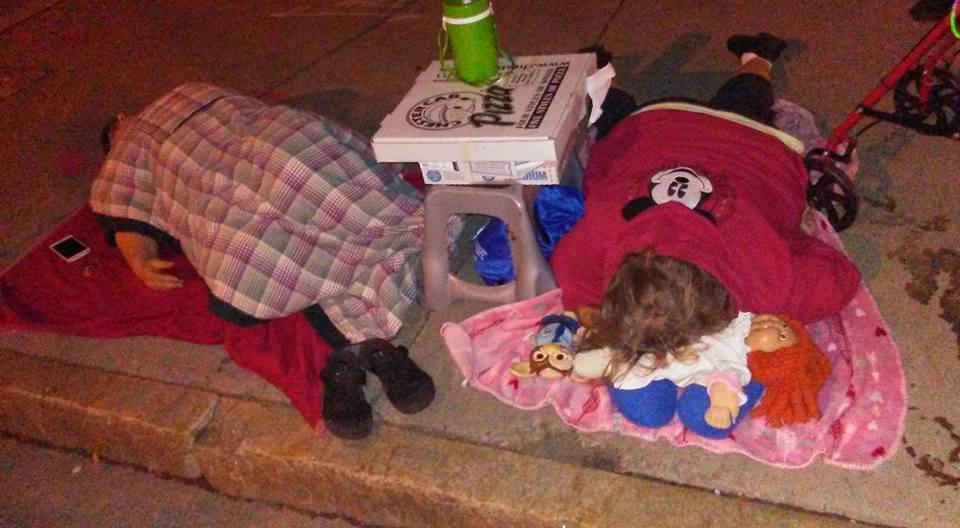
Then on July 7th, Cameron went to Columbus, Ohio to Senator Rob Portman’s office to protest the Senate’s health care bill. Portman has expressed concern about the cuts in it, because of how it could affect opioid users, not the disabled. Cameron was among more than a dozen ADAPT protestors who were arrested in Columbus after police said they were blocking elevator doors.
Why buses have lifts
The disability rights movement is built on protests like these. ADAPT, short for “Americans Disabled for Accessible Public Transit,” pledges to do whatever is necessary, as long as it is nonviolent, to protect the civil rights of disabled people. There are currently chapters in 24 states, and organizers estimate the total number of members could be in the thousands.
In 1978, the Atlantis Community, an independent living community for disabled people in Colorado, and Wade Blank, a nondisabled Reverend, organized a protest in Denver that helped spark the movement. The “Gang of 19” laid in front of buses chanted “We Will Ride!” to protest the fact that the buses weren’t accessible to people in wheelchairs.
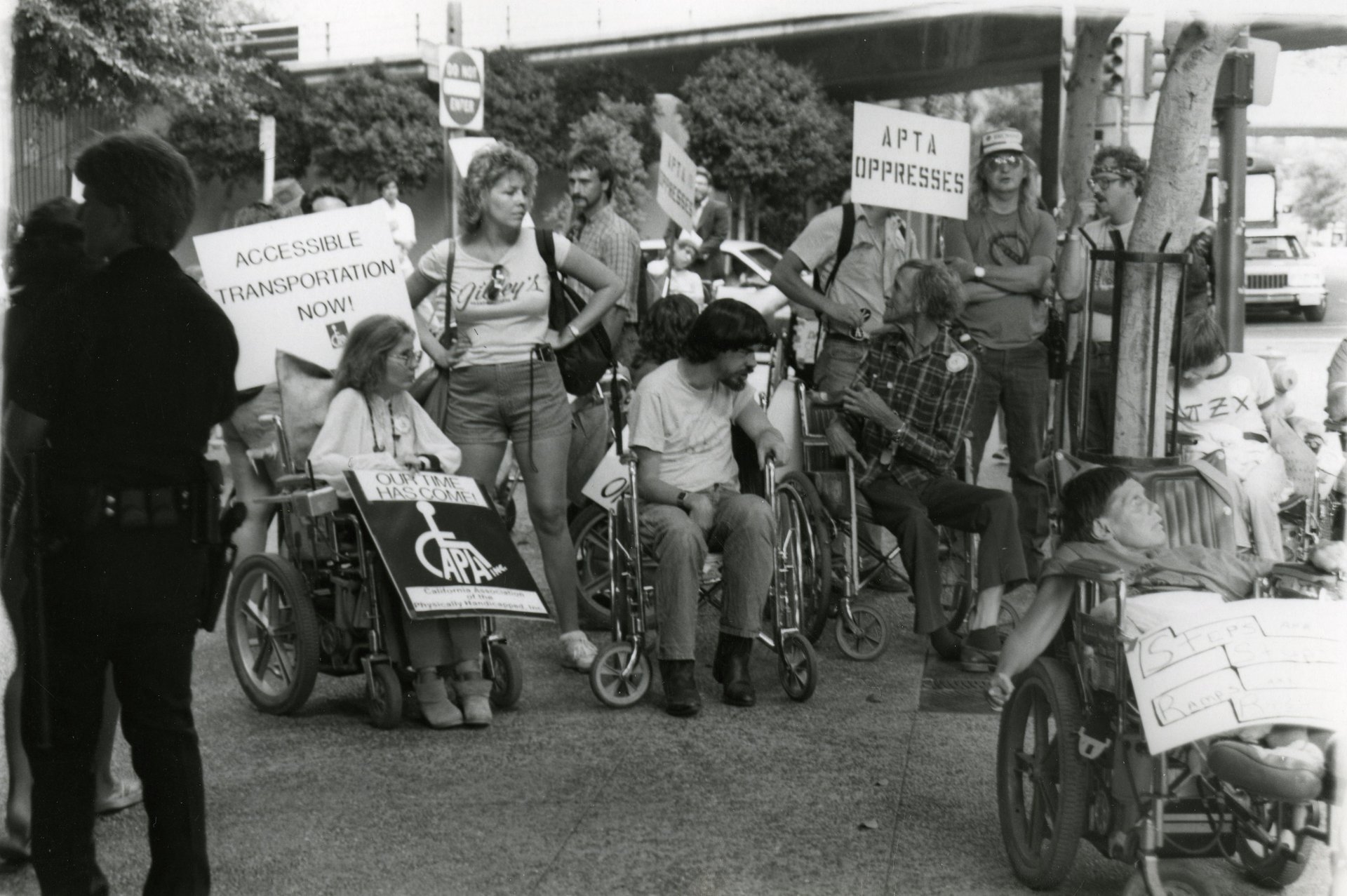
They blocked an intersection overnight until local transportation officials agreed to talk. Across the country, other disability rights protestors staged similar demonstrations, adopting strategies from the civil rights movement to show how ostracized they were from the rest of society.
The landmark Americans with Disabilities Act, passed in 1990, was an outgrowth of those protests. The act prohibits discrimination against people with disabilities in “employment, transportation, public accommodations, communications and access to state and local government programs and services,” among other areas.
Ready to be arrested
Since the June protest in DC, ADAPT chapters have been “popping up like mushrooms” across the country, Cameron said. The group offers training sessions that teach the history of ADAPT, how to plan a protest, and what to expect from police. Getting arrested and being harassed is part of being a disability rights activist, members say, and training is essential.
“We want to make sure that people know how to respond if the police come,” says Woodward. They also teach “how to respond to people yelling at you to ‘Go home and get a job,’ and how to respond nonviolently, even if you’re being treated disrespectfully.”
Woodward has been arrested 15 times, including at the McConnell “die-in,” where she was photographed with her arms handcuffed behind her.
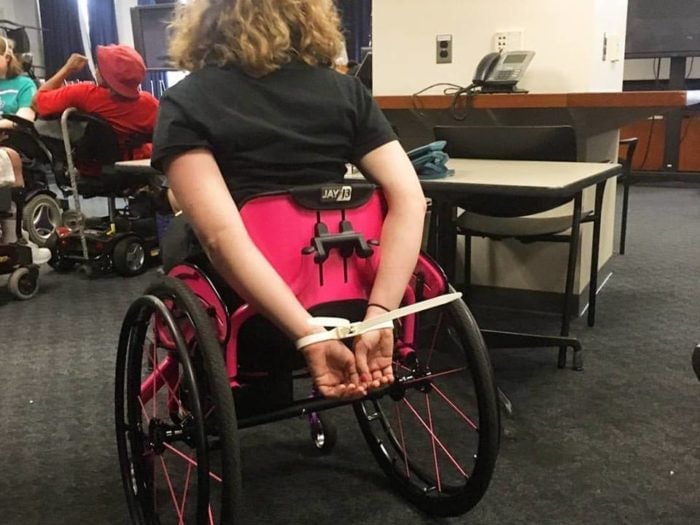
“I understand that it won’t always be polite officers kindly escorting you away,” Woodward said. “Sometimes it’s people literally throwing your body. I am so thankful that I’ve had training for that.”
Cameron sees the current threats to Medicaid as politically-motivated. “They want to get rid of Obamacare and the Affordable Care Act to do away with any legacy Obama has had,” she said. “They want to erase the good works he’s done from the record.”
The Affordable Care Act has had its issues, activists say, but it has dramatically increased disabled people’s access to care because it has banned insurance companies from refusing to take on people with pre-existing conditions. “We have to fight against not only the Better Care Reconciliation Act but any legislation that cuts or caps Medicaid,” Cameron said. Otherwise “people will literally die.”